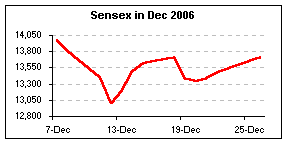As Noel Whittaker has said, "Life is full of uncertainties. Future investment earnings, interest and inflation rates are not known to anybody. However, one thing is for sure, that those who put an investment program in place will have a lot more money when they come to retire than those who never get around to it"
Investing is not as difficult or as expensive as most people think. Most of us just do not do it well. Lets look at some of the reasons that cause investors to falter.
Market Timing: Benjamin Graham in his book 'The intelligent Investor' has quoted "We are convinced that the intelligent investor can derive satisfactory results from pricing of either type (market timing or fundamental analysis via price). We are equally sure that if he places his emphasis on timing, in the sense of forecasting, he will end up as a speculator and with a speculator's financial results." And "The speculator's primary interest lies in anticipating and profiting from market fluctuations. The investor's primary interest lies in acquiring and holding suitable securities at suitable prices."
Market timing is the strategy of making buy or sell decisions of stocks by attempting to predict future market price movements. A lot of investors believe that there is a right time and a wrong time to invest in stocks, and that it is possible for most of us to predict which is which. This is absolutely wrong, as unfortunately, stock prices do not always move for the most logical or easily predicable of reasons. An unexpected event can send a stock's price up or down and you cannot predict those movements with charts. The IT stocks' boom of the late 1990s was a good example of what happens when investors in the excitement of the moment, consciously or not, became market timers. As seen from the chart below, Sensex has been extremely volatile over the last 3 weeks. Timing in such a scenario can be very risky.
 Buying high and selling low:
Buying high and selling low: It violates the most fundamental element of investing, yet thousands of investors practice it every day. This is one consequence of failing to time the market correctly, and it most often results from investors chasing the latest hot stock. As soon as the market or sector they are investing in loses ground they sell and go looking for the hot market. Eventually a new sector with some strong recent gains is chosen to invest in and the investor is again confident that he or she is back on the fast track to riches. Then it happens again and again. All the instruments they purchase have proven track records, yet their overall portfolio reflects a below-average return. He is an investor who makes emotional decisions, tries to time the market, or loses sight of his long-term goals. In other words, he is an investor who has forgotten the "Three D's" of investing -
- Diversify: Don't put all your eggs in one basket or your money in one sector. As the economy expands and slows, money has a tendency to flow back and forth between equities and fixed instruments. But inside these two markets exists a selection of sectors that also expand and slow with differing rates. This makes the proposition of timing the market even more absurd since you have to time the smaller sectors against the broader sectors. The solution to this is to diversify. This process reduces the unsystematic risk, which is unique to the company or the sector. However, risk which stem from perils that affect the economy cannot be reduced by diversification. The principle of diversification involves investing in a portfolio of securities so that losses in some will offset gains in others, thereby reducing the variability of returns.
- Dollar Cost Average: Dollar cost averaging is the systematic purchase of investment instruments over time. By buying an equal amount each period, you should end up with a cost basis that is close to the average over that period. This is especially valuable in volatile markets where dramatic swings are experienced and diving in on the wrong day could be a significantly sobering event. Dollar Cost Averaging does not guarantee a profit nor protect against loss. However, a Dollar Cost Averaging plan can offer a disciplined, systematic approach to investing that could be the cornerstone of your long-term planning.
- Discipline: This is the single most important factor in avoiding the before mentioned traps. Although the market moves based on the economy, it can also swing wildly based on psychological reasons such as political turmoil, rumors on interest rate changes, or other world events. If the fundamentals of the economy still match your overall portfolio objectives then you should stay on the course. This is where the financial professional often becomes the deciding factor between the investor's success or failure in achieving his or her goals.
To conclude...Paul Samuelsom, the renowned American economist has rightly said, "The investing should be more like watching paint dry or watching grass grow. If you want excitement, take US$ 800 and go to Las Vegas". The 3 D's will not just make you work hard for your money, but even your money will start working for you.
 INFORMATION CLUB
INFORMATION CLUB Informative Zone
Informative Zone Financial Literacy
Financial Literacy Let your money work for you!
Let your money work for you! INFORMATION CLUB
INFORMATION CLUB Informative Zone
Informative Zone Financial Literacy
Financial Literacy Let your money work for you!
Let your money work for you!
